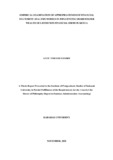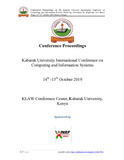EMPIRICAL EXAMINATION OF APPROPRIATENESS OF FINANCIAL STATEMENT ANALYSIS MODELS IN INFLUENCING SHAREHOLDER WEALTH OF LISTED NON FINANCIAL FIRMS IN KENYA
Abstract
The market share price is considered by investors to be an observable and real measure of shareholder wealth, despite possibility of mistakes by financial markets in assessment of shareholder wealth. Investing public and market analysts conduct financial statement analysis to accurately measure performance of firms. Due to several users of financial statements a single indicator of performance may not influence share prices. Financial statement users expect fraud and mismanagement issues to be detected by external auditors. Yet to the contrary, corporate irregularities at times erupt immediately unqualified audit reports are released. Unqualified audit reports and market price of shares relied upon by investors seem to be of minimal use as indicators of shareholder wealth. There is need to establish whether change in market price of shares is truly influenced by financial results derived from performance indicators such as profitability, liquidity, operational efficiency, leverage, and market performance ratios. The study objectives were to evaluate appropriateness of profitability, liquidity, operational efficiency, leverage, and market performance ratio models in influencing shareholder wealth of Nairobi Security Exchange (NSE) listed non-financial firms. The study derived support from stakeholder theory, stewardship theory and positive accounting theory. Correlational research design was used. The study population was all firms listed at the NSE for five financial years 2012 to 2016. Purposive sampling was done and secondary data used for the study. Data was collected through computation of average rate of change (AROC) in market price of shares and profitability, liquidity, operational efficiency, leverage, and market performance ratios. Panel data was analysed using descriptive and inferential statistical analysis. Inferential statistics involved development and testing predictive ability of financial statement analysis panel data regression models. The fixed effects model was unsuitable for evaluating appropriateness of profitability, operational efficiency, leverage, and market performance ratios models since p values for the respective Hausman tests were > 0.05. However, fixed effects model was found to be suitable for evaluating appropriateness of liquidity ratios model since the Hausman test resulted in p value < 0.05. The random effects model was suitable for assessing appropriateness of profitability, operational efficiency, leverage and market performance ratios models. Overall, profitability, liquidity, operational efficiency and leverage ratios models had no statistically significant influence on AROC in market price of shares since their respective p values were > 0.05, leading to the conclusion that these ratio models were not statistically significant appropriate in influencing shareholder wealth of NSE listed non financial firms. Further, profitability, operational efficiency, leverage, and market performance ratios models had no evidence of panel effects and could be evaluated using simple ordinary least square (OLS) regression models. Market performance ratio (MPR), price earnings ratio (PER), price to sales ratio (PTSR), dividend payout ratio (DPOR) and dividend yield (DY) had statistically significant influence on AROC in market price of shares since their respective p values were <0.05. Market performance ratios model had statistically significant appropriateness in influencing shareholder wealth of NSE listed non-financial firms since its p < 0.05.
Collections
Related items
Showing items related by title, author, creator and subject.
-
Mekatilili wa Menza: Her movement as a Model for Africa’s Feminist Theologians
wa Chidongo, Dr. Tsawe-Munga (Kabarak University, 2016)Pre- colonial Women for years (Africa) in particular were regarded simply as being weak, fearful and with no power to speak out their intentions and greavances. They were underestimated; said to be only suitable for ... -
ESTIMATION OF MISSING VALUES FOR BILINEAR TIME SERIES MODELS WITH GARCH INNOVATIONS USING NONPARAMETRIC METHODS
ABAJA, POTI OWILI (Kabarak University, 2016)A time series is defined as data recorded sequentially over a specified period. Since the data are records taken overtime, missing observations in time series are very common. They may occur as a result of lost records, ... -
Agent Based Computational Model For Memory Retention: A Focus On Children With Dyslexia
Abuodha, Lucy A. (KABARAK UNIVERSITY, 2019-10)Memory retention can be defined as a process by which both working memory and long term memory preserves knowledge so that it can locate, identify and retrieve it in the future. Children with dyslexia suffer from lack ...


